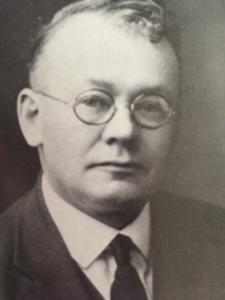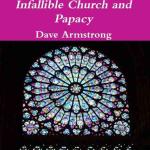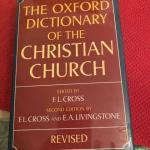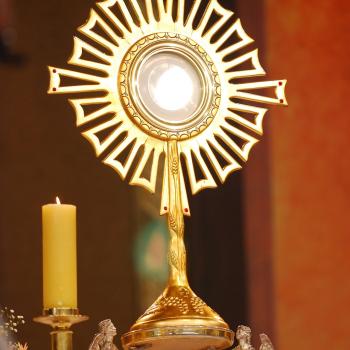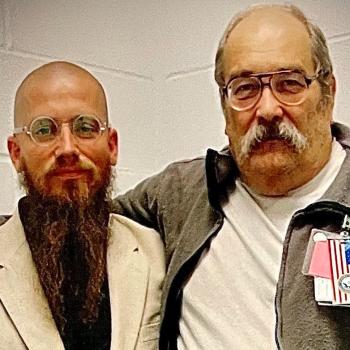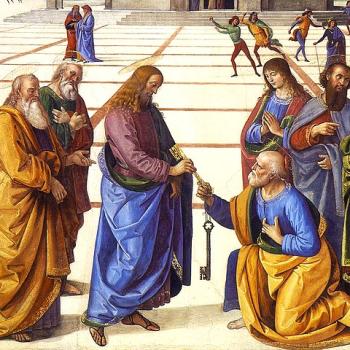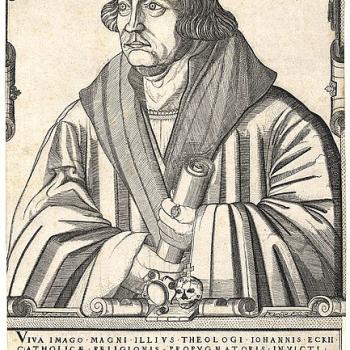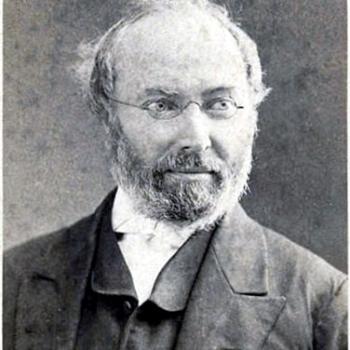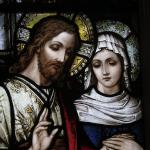“Please Hit ‘Subscribe’”! If you have received benefit from this or any of my other 4,600+ articles, please follow this blog by signing up (with your email address) on the sidebar to the right (you may have to scroll down a bit), above where there is an icon bar, “Sign Me Up!”: to receive notice when I post a new blog article. This is the equivalent of subscribing to a YouTube channel. Please also consider following me on Twitter / X and purchasing one or more of my 55 books. All of this helps me get more exposure, and (however little!) more income for my full-time apologetics work. Thanks so much and happy reading!
***
I am responding to the book, Roman Catholicism in the Light of Their Own Scriptures and Authorities (Anderson, Indiana: Gospel Trumpet Company, 1917), by Rev. Herbert McClellan Riggle (1872-1952). He was a Church of God pastor (Anderson, Indiana branch: a “holiness” Christian denomination with roots in Wesleyan-Arminianism), revivalist, and evangelist. Rev. Riggle was the author of eighteen theological books. In this installment I reply to the section, “Humble Equality of the Primitive Ministry” (pp. 35-44). His words will be in blue.
***
Rev. Riggle, according to the congregationalist ecclesiology of the Church of God, contends in this section that bishops and elders are on the same level of authority, which exists in the local church. According to this view, there is no “hierarchical Church government”; no bishops who oversee more than one local Church. Hence he writes:
The apostle Peter placed himself on a common level with the local presbyters, and also stated that he was a fellow presbyter.
Jesus called His apostles “friends” (Jn 15:15), washed their feet (Jn 13:12) and was subject to the authority of His parents Mary and Joseph (“obedient to them”: Lk 2:51). Does that mean that they were all equal to or superior in authority to Him?
. . . the terms “bishop” and “elder” were used interchangeably, and applied to all the traveling ministers. All the local preachers were bishops . . .
. . . the modern office of bishop was unknown in the apostolic church . . .
It’s true that offices in the early Church were fluid and overlapping. They were still in a state of primitive development. I wrote about this in my first book (A Biblical Defense of Catholicism) in 1996:
As is often the case in theology and practice among the earliest Christians, there is some fluidity and overlapping of these three vocations (for example, compare Acts 20:17 with 20:28; 1 Timothy 3:1-7 with Titus 1:5-9). But this does not prove that three offices of ministry did not exist. For instance, St. Paul often referred to himself as a deacon or minister (1 Cor. 3:5; 4:1, 2 Cor. 3:6; 6:4; 11:23; Eph. 3:7; Col. 1:23-25), yet no one would assert that he was merely a deacon, and nothing else. Likewise, St. Peter calls himself a fellow elder (1 Pet. 5:1), whereas Jesus calls him the rock upon which he would build his Church, and gave him alone the keys of the kingdom of heaven (Matt. 16:18-19). These examples are usually indicative of a healthy humility, according to Christ’s injunctions of servanthood (Matt. 23:11-12; Mark 10:43-44).
Upon closer observation, clear distinctions of office appear, and the hierarchical nature of Church government in the New Testament emerges. Bishops are always referred to in the singular, while elders are usually mentioned plurally. The primary controversy among Christians has to do with the nature and functions of bishops and elders (deacons have largely the same duties among both Protestants and Catholics).
Catholics contend that the elders/presbyters in Scripture carry out all the functions of the Catholic priest: [I then provided 17 instances of this similarity, with tons of Scripture references] . . .
Bishops (episkopos) possess all the powers, duties, and jurisdiction of priests, with the following important additional responsibilities:
- Jurisdiction over priests and local churches, and the power to ordain priests: Acts 14:22; 1 Timothy 5:22; 2 Timothy 1:6; Titus 1:5.
- Special responsibility to defend the Faith: Acts 20:28-31; 2 Timothy 4:1-5; Titus 1:9-10; 2 Peter 3:15-16.
- Power to rebuke false doctrine and to excommunicate: Acts 8:14-24; 1 Corinthians 16:22; 1 Timothy 5:20; 2 Timothy 4:2; Titus 1:10-11.
- Power to bestow Confirmation (the receiving of the indwelling Holy Spirit): Acts 8:14-17; 19:5-6.
- Management of Church finances: 1 Timothy 3:3-4; 1 Peter 5:2.
In the Septuagint, episkopos is used for “overseer” in various senses, for example: officers (Judg. 9:28; Isa. 60:17), supervisors of funds (2 Chron. 34:12, 17), overseers of priests and Levites (Neh. 11:9; 2 Kings 11:18), and of temple and tabernacle functions (Num. 4:16). God is called episkopos at Job 20:29, referring to his role as Judge, and Christ is an episkopos in 1 Peter 2:25 (RSV: “Shepherd and Guardian of your souls”). (Appendix Two: “The Visible, Hierarchical, Apostolic Church,” pp. 251-254)
When the apostles set churches in order, they did not ordain one bishop and his presbytery, but simply “ordained priests [elders,” A. v.] in every church” (Acts 14:22) [should be Acts 14:23]. Paul did not instruct Titus to ordain one bishop and a presbytery of elders for his sanhedrin in every city in Crete, but left him to simply “ordain priests [“elders,” A. V.] in every city.”
Here Rev. Riggle contradicts his own stated position. Note that Paul and Barnabas and Titus were overseeing multiple local churches. Thus, they were functioning as bishops in the hierarchical or episcopal sense. In noting that Paul and Titus were ordaining elders (what we would regard as priests) “in every church” he neglects to see that in so doing they themselves were acting as hierarchical bishops. Paul commissioned Titus to do exactly the same thing: “appoint elders in every town as I directed you,” (Titus 1:5, RSV, as throughout). St. Paul refers to his own de facto office of bishop in the same sense:
1 Corinthians 7:17 . . . This is my rule in all the churches.
2 Corinthians 11:28 And, apart from other things, there is the daily pressure upon me of my anxiety for all the churches.
The Jerusalem Council also clearly indicates this hierarchical authority. It was a meeting of apostles and elders in the Church, including Peter, Paul, James, and Barnabas (Acts 15:2, 4, 6, 22-23; 16:4), whose decree was brought about through the decisive words of St. Peter, the leader of the early Church, and confirmed by the Holy Spirit (Acts 15:28), and which was promulgated throughout Asia Minor (Turkey) as binding by the Apostle Paul (Acts 16:4).
There is also further evidence of monarchical bishops in the book of Revelation., and an abundance of patristic corroboration of bishops (in the Catholic sense) in the early Church:
*
“And the apostles and ancients [“elders,” A. v.] assembled to consider of this matter” (Acts 15:6). No mention is made of a bishop presiding in this apostolic assembly. Only apostles and ancients (elders) are mentioned.
One must examine it more closely. Peter and James and Paul were apostles. But they are treated differently in the text. Paul’s words aren’t even recorded, whereas Peter’s are given center stage (Acts 15:7-11). After he spoke, the reverence in which his words were regarded is seen in the description: “And all the assembly kept silence” (15:12). James, whom virtually all Church historians regard as the bishop of Jerusalem at that time, then gave the final address, and he started by saying, “Simeon [Peter] has related how God first visited the Gentiles, to take out of them a people for his name. And with this the words of the prophets agree,” (Acts 15:14-15).
This again shows deference to Peter as the leader and primary influence on the decision. After all, Peter had received a vision from God, earlier in the book of Acts, about this very question of Gentiles and the Jewish Law. He received direct revelation and then made an infallible decree, guided by the Holy Spirit. That’s hierarchy. That isn’t everyone functioning on the same level of authority. James appears to function as a sort of master of ceremonies, since he was the local bishop and in effect “host” of the council. But Peter is clearly portrayed as the leader and central figure.
*
***
*
Practical Matters: Perhaps some of my 4,600+ free online articles (the most comprehensive “one-stop” Catholic apologetics site) or fifty-five books have helped you (by God’s grace) to decide to become Catholic or to return to the Church, or better understand some doctrines and why we believe them.
Or you may believe my work is worthy to support for the purpose of apologetics and evangelism in general. If so, please seriously consider a much-needed financial contribution. I’m always in need of more funds: especially monthly support. “The laborer is worthy of his wages” (1 Tim 5:18, NKJV). 1 December 2021 was my 20th anniversary as a full-time Catholic apologist, and February 2022 marked the 25th anniversary of my blog.
PayPal donations are the easiest: just send to my email address: apologistdave@gmail.com. Here’s also a second page to get to PayPal. You’ll see the term “Catholic Used Book Service”, which is my old side-business. To learn about the different methods of contributing (including Zelle), see my page: About Catholic Apologist Dave Armstrong / Donation Information. Thanks a million from the bottom of my heart!
*
***
*
***
Photo credit: photograph of Rev. Herbert McClellan Riggle, on the Find a Grave website.
Summary: Herbert Riggle, a Church of God pastor, contended that bishops and local “elders” were the same office in the Bible. I provide biblical counter-evidence.


